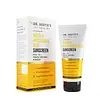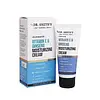What's inside
What's inside
 Key Ingredients
Key Ingredients

 Benefits
Benefits

 Concerns
Concerns

 Ingredients Side-by-side
Ingredients Side-by-side

Water
Skin ConditioningEthylhexyl Methoxycinnamate
UV AbsorberButyl Methoxydibenzoylmethane
UV AbsorberOctocrylene
UV AbsorberPhospholipids
Skin ConditioningButylene Glycol
HumectantPropanediol
SolventHelianthus Annuus Seed Oil
EmollientSodium Polyacrylate
AbsorbentXylitol
HumectantCurcuma Longa Root Extract
MaskingCaprylic Acid
CleansingGlyceryl Stearate
EmollientCyclopentasiloxane
EmollientTitanium Dioxide
Cosmetic ColorantZinc Oxide
Cosmetic ColorantCoco-Caprylate/Caprate
EmollientPolyglyceryl-3 Polyricinoleate
EmulsifyingIsostearic Acid
CleansingHyaluronic Acid
HumectantAloe Barbadensis Leaf Juice
Skin ConditioningPhenoxyethanol
PreservativeTrehalose
HumectantHydrolyzed Vegetable Protein
Skin ConditioningTocopheryl Acetate
AntioxidantAllantoin
Skin ConditioningDipotassium Glycyrrhizate
HumectantSodium Benzoate
MaskingBenzyl Alcohol
PerfumingMelanin
Skin ProtectingSodium Gluconate
Skin ConditioningWater, Ethylhexyl Methoxycinnamate, Butyl Methoxydibenzoylmethane, Octocrylene, Phospholipids, Butylene Glycol, Propanediol, Helianthus Annuus Seed Oil, Sodium Polyacrylate, Xylitol, Curcuma Longa Root Extract, Caprylic Acid, Glyceryl Stearate, Cyclopentasiloxane, Titanium Dioxide, Zinc Oxide, Coco-Caprylate/Caprate, Polyglyceryl-3 Polyricinoleate, Isostearic Acid, Hyaluronic Acid, Aloe Barbadensis Leaf Juice, Phenoxyethanol, Trehalose, Hydrolyzed Vegetable Protein, Tocopheryl Acetate, Allantoin, Dipotassium Glycyrrhizate, Sodium Benzoate, Benzyl Alcohol, Melanin, Sodium Gluconate
Water
Skin ConditioningParaffinum Liquidum
EmollientTocopheryl Acetate
AntioxidantPropylene Glycol
HumectantSteareth-2
EmulsifyingCaprylic/Capric Triglyceride
MaskingCetyl Alcohol
EmollientSteareth-21
CleansingPEG-20
HumectantDimethicone
EmollientXylitylglucoside
HumectantAnhydroxylitol
HumectantXylitol
HumectantStearyl Alcohol
EmollientSodium Acrylates Copolymer
Lecithin
EmollientPhenoxyethanol
PreservativeTriethanolamine
BufferingBHT
AntioxidantPotassium Sorbate
PreservativeDisodium EDTA
Citric Acid
BufferingPanax Ginseng Root Extract
EmollientWater, Paraffinum Liquidum, Tocopheryl Acetate, Propylene Glycol, Steareth-2, Caprylic/Capric Triglyceride, Cetyl Alcohol, Steareth-21, PEG-20, Dimethicone, Xylitylglucoside, Anhydroxylitol, Xylitol, Stearyl Alcohol, Sodium Acrylates Copolymer, Lecithin, Phenoxyethanol, Triethanolamine, BHT, Potassium Sorbate, Disodium EDTA, Citric Acid, Panax Ginseng Root Extract
Ingredients Explained
These ingredients are found in both products.
Ingredients higher up in an ingredient list are typically present in a larger amount.
Phenoxyethanol is a preservative that has germicide, antimicrobial, and aromatic properties. Studies show that phenoxyethanol can prevent microbial growth. By itself, it has a scent that is similar to that of a rose.
It's often used in formulations along with Caprylyl Glycol to preserve the shelf life of products.
Tocopheryl Acetate is AKA Vitamin E. It is an antioxidant and protects your skin from free radicals. Free radicals damage the skin by breaking down collagen.
One study found using Tocopheryl Acetate with Vitamin C decreased the number of sunburned cells.
Tocopheryl Acetate is commonly found in both skincare and dietary supplements.
Learn more about Tocopheryl AcetateWater. It's the most common cosmetic ingredient of all. You'll usually see it at the top of ingredient lists, meaning that it makes up the largest part of the product.
So why is it so popular? Water most often acts as a solvent - this means that it helps dissolve other ingredients into the formulation.
You'll also recognize water as that liquid we all need to stay alive. If you see this, drink a glass of water. Stay hydrated!
Learn more about WaterXylitol is a humectant and prebiotic. It can help with dry skin.
In studies, xylitol has been shown to improve dry skin. It decreased transepidermal water loss, or when water passes through the skin and evaporates. Xylitol also showed to help improve the biomechanical properties of the skin barrier.
The prebiotic property of xylitol may also help reinforce our skin's natural microbiome. Having a healthy microbiome prevents infection by bad bacteria and helps with hydration.
As a humectant, Xylitol helps draw moisture from both the air and from deeper skin layers. This helps keep skin hydrated.
Xylitol is a sugar alcohol and commonly used as a sugar substitute. It is naturally occurring in plants such as strawberries and pumpkin.
Learn more about Xylitol